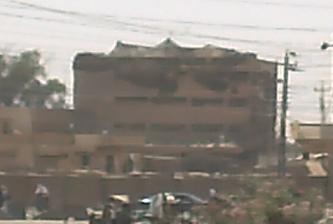Making Enemies in Samarra
A friend from Samarra told me about recent events in his town. He said that the police from outside town took over the entire commercial area behind the excuse of protecting the re-building of the bombed shrine. They took over many shops, administrative and residential buildings without compensating the owners who depend on the buildings for business and livelihood. He said they occupied what is known as the Azzawi building, turned it into a bunker and shot at neighboring buildings, resulting in the senseless evacuation of people scared of random shooting. Then barricades and cement blocks appeared in places far away from the location of the shrines, in positions with no security value but with commercial and vital use to the town’s population. Earlier, the main bridge connecting the town to Baghdad was blocked in what appeared as a blockade and mass punishment for a crime whose instigators were not found. The whole series of events seems to come at a wrong timing; it was announce in August 4, 2007 that the main Al Qaida planner of the two Samarra shrine bombings was killed, the natural expected result would be easing of tension, yet the opposite occurred. The increase in confrontation leads us to doubt the claim and to question the reasons behind the escalation.

The bringing of police force from outside its home territories always expensive and risky, such a step should always be taken very seriously and for a short time. And the use of local ethnic police force has been the followed practice since the beginning of the modern state of Iraq. The escalation in Samarra undoubtedly leads the local population to see the police as intruders and to reactions similar to what we saw with the occupation, which came with the pretext of fighting terrorism but resulted in more, and brought new external intrusions. And so, history may repeat itself in creating extremism with more bloodshed and inviting outsiders and the creation of a new “Green Zone” in downtown Samarra.
Every action has an opposite reaction, enemies are created from sectarian strife and its continuation sets fixed attitudes; if the re-building process is completed before the situation is diffused then tension will increase. We have to recognize a narrow window of opportunity before animosity sets and positions hardened. In particular, we are waiting for two decisions by the Iraqi government:
1- Immediate payment of fair compensation and return of affected residences and shops located outside a predetermined security zone. And fair rent to buildings inside the zone until the situation goes back to normal.
2- Exchange the outside police force with regular army units and use only local police for interface with local civilians. Iraqis in different parts are frequently told by police individuals that the police is not responsible for confronting terrorism, and we point out that defining the duties of ministries is the responsibility of the head of the government. Therefore we are waiting to hear the position of Prime Minister Nouri Al Maliky: either confirm the role of the police in facing terrorism for the rest of Iraq or deny the role as we call and let the regular army do its duty. But more postponement will only lead to more intrusions and instability and the creation of more enemies who cause more chaos in Iraqi society.






